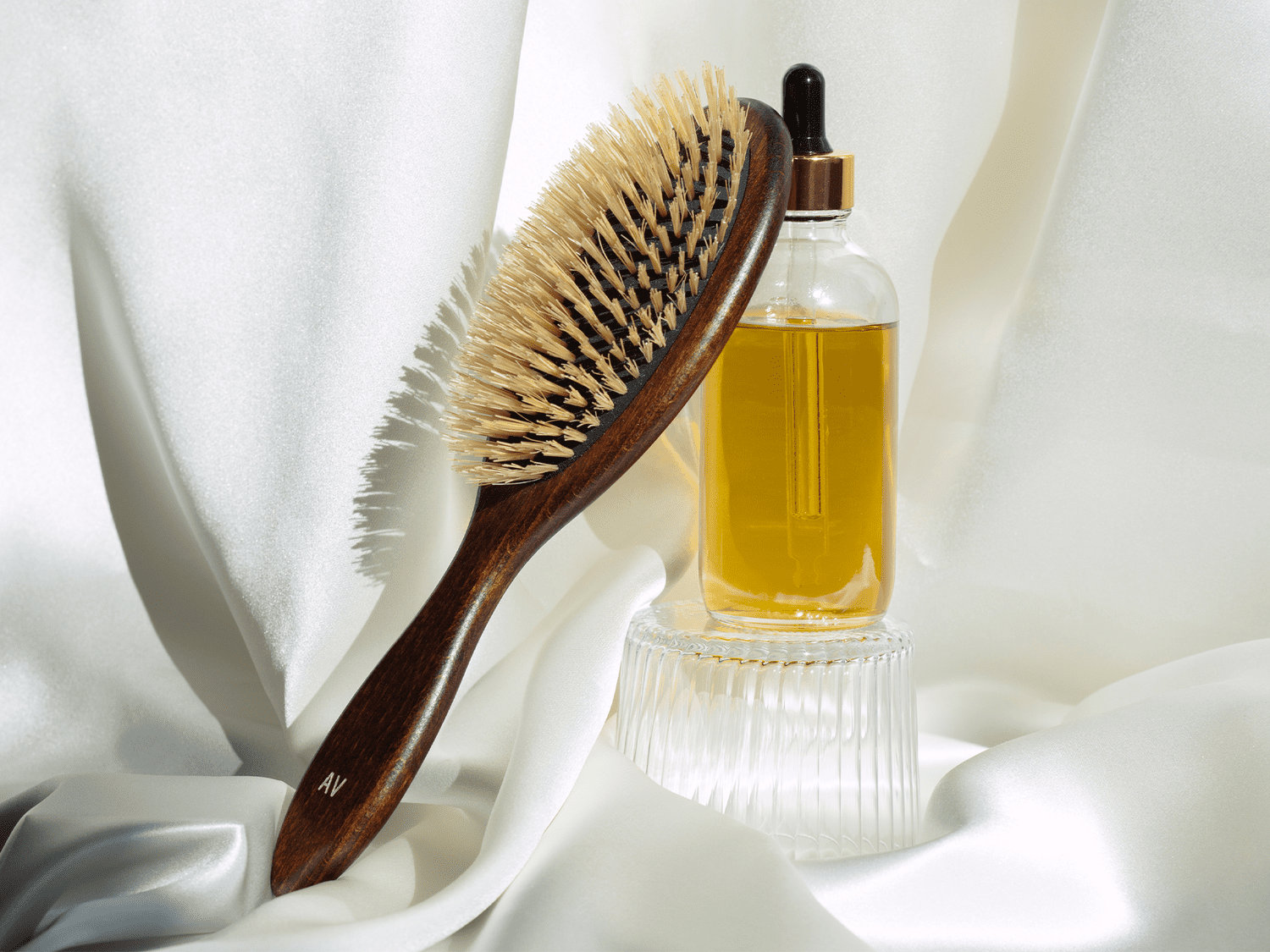Can Castor Oil Give You Luxuriously Long, Thick, And Healthy Hair? Experts Weigh In
Castor oil may boost scalp circulation and strengthen hair, but lacks conclusive evidence for promoting regrowth. Contents of ricinoleic acid may stimulate hair follicles and improve circulation for healthier, stronger hair.
Several studies hint at potential improvement in scalp health, circulation, and hair strength, as well as soothing irritated, flaking scalps. Additionally, anecdotal evidence suggests accelerated hair growth, but clinical evidence is sparse. However, some individuals with fine or greasy hair may find castor oil leaves their strands greasy and weighed down.
Moreover, rare cases report ‘felting’ or ‘matting’ of hair due to castor oil. Despite limitations in clinical evidence, castor oil appears promising in certain cases for improving overall hair health.
The Science Behind Castor Oil
Castor oil is a popular natural remedy known for its potential to improve hair health, leading to long, thick, and luscious locks. The science behind castor oil revolves around its unique composition and properties that contribute to its hair-nourishing effects. To better understand how castor oil can benefit your hair, let’s delve into its key components and their role in promoting healthy hair growth.
Ricinoleic Acid And Circulation
Ricinoleic acid is the primary fatty acid found in castor oil, known for its ability to stimulate circulation in the scalp. By enhancing blood flow to the hair follicles, this fatty acid promotes nutrient delivery to the hair roots, which can result in stronger and healthier hair.
Possible Hair Regrowth
While evidence is not conclusive, some individuals claim that using castor oil may stimulate hair regrowth due to its potential to nourish the scalp and support a healthy hair environment. Although further research is needed to establish its efficacy in this regard, the nourishing properties of castor oil suggest that it may contribute to optimal conditions for hair regrowth.
Anti-inflammatory Properties
In addition to its circulation-boosting effects, castor oil exhibits anti-inflammatory properties that can help soothe scalp irritation and create a healthy foundation for hair growth. By reducing inflammation, castor oil promotes a conducive environment for healthy hair that is less susceptible to damage and breakage.
Benefits Of Castor Oil For Hair
Hair Thickness
Castor oil contains ricinoleic acid, which boosts scalp circulation and promotes stronger hair.
Improved Scalp Health
Applying castor oil can soothe irritation and create a healthy scalp environment for hair growth treatments.
Reduced Inflammation
The anti-inflammatory properties of castor oil can reduce scalp inflammation that may inhibit hair growth.
Debunking Myths And Misconceptions
Discover the truth about castor oil’s effects on hair health. While it may boost circulation in the scalp, experts suggest no concrete evidence for promoting hair growth. Be cautious of potential drawbacks like hair “felting” or allergic reactions, and consult a professional for best results.
Hair Growth Rate With Castor Oil
Many people believe that using castor oil can significantly increase hair growth rate. While it is true that castor oil does contain beneficial properties for hair health, there is no conclusive scientific evidence to support the claim that it can stimulate hair growth beyond the average rate. According to experts, the average human hair follicle grows just over a centimeter a month. Although some anecdotal evidence suggests that using castor oil once a month may accelerate growth three to five times, more research is needed to confirm these claims.
Potential Disadvantages
- There have been rare cases where using castor oil on hair resulted in a condition called ‘felting’ or ‘matting’, where the hair becomes twisted and tangled, similar to a bird’s nest. However, it is important to note that this is a rare disorder and may not occur in the majority of cases.
- Castor oil and its derivatives can cause possible allergic contact dermatitis in some individuals. If you have a known allergy to castor oil or have sensitive skin, it is advisable to perform a patch test before using castor oil on your hair.
Effect On Different Hair Types
Certain hair types may have different reactions to castor oil. Individuals with fine or greasy hair may find that castor oil leaves their strands greasy and weighed down. In such cases, it is recommended to avoid products containing castor oil and instead opt for a clarifying shampoo to maintain a balanced scalp environment.
:max_bytes(150000):strip_icc()/GettyImages-700712243-c3849204f9894fd6802474352a11362e.jpg)
Credit: www.instyle.com
Expert Opinions And Insights
Experts’ opinions and insights vary on the effectiveness of castor oil for promoting long, thick, and healthy hair. While some believe the oil’s ricinoleic acid may boost scalp circulation for stronger hair, others caution it may lead to hair greasiness and possible allergic reactions.
The overall conclusive evidence remains uncertain.
Medical Professional Perspectives
Medical professionals suggest that castor oil may boost scalp circulation and promote stronger hair, but evidence of promoting hair regrowth is inconclusive.
User Experiences And Anecdotal Evidence
There are anecdotal claims that using castor oil can accelerate hair growth up to five times the normal rate, but clinical evidence to support this is lacking.
Current Scientific Data
Research indicates that in rare cases, castor oil can cause hair ‘felting’ or allergic contact dermatitis, highlighting the need for caution in its use.
Best Practices For Using Castor Oil
When using castor oil for hair growth, it’s crucial to follow the best practices to ensure effective and safe application. From scalp massaging techniques to the frequency of application and choosing the right castor oil product, these practices can maximize the benefits of using castor oil for long, thick, and healthy hair. Here are the key best practices you should consider:
Scalp Massaging Techniques
Proper scalp massaging techniques can enhance the absorption of castor oil and stimulate hair follicles, promoting healthy hair growth. To achieve the best results, gently massage castor oil into your scalp using circular motions for 5-10 minutes. This helps to improve blood circulation and ensures the oil reaches the hair roots.
Frequency Of Application
The frequency of applying castor oil depends on your hair type and condition. For normal hair, applying castor oil 1-2 times a week is sufficient. However, if you have dry or damaged hair, you can apply it 2-3 times a week. It’s essential to find a balance to prevent excessive oil buildup while nourishing your hair.
Choosing The Right Castor Oil Product
When choosing a castor oil product, opt for organic and cold-pressed castor oil as it retains more nutrients and is free from harmful chemicals. Look for high-quality, pure castor oil without added synthetic ingredients or fragrances. Additionally, consider the consistency of the oil – thicker castor oil is beneficial for deep conditioning, while lighter formulas are suitable for daily use.
Alternatives And Complementary Hair Treatments
While castor oil is known for its potential benefits in promoting long, thick, and healthy hair, there are also other alternatives and complementary hair treatments that you can consider. By combining castor oil with other oils, exploring additional hair growth methods, or incorporating professional hair care products, you may enhance the effectiveness of your hair care routine.
Combining Castor Oil With Other Oils
One way to maximize the benefits of castor oil is by combining it with other nourishing oils. For example, you can mix equal parts of castor oil and coconut oil to create a potent hair treatment. Coconut oil is rich in essential fatty acids, vitamins, and minerals that deeply moisturize the hair, reducing dryness and promoting overall hair health. This combination can help nourish the scalp, strengthen the hair follicles, and improve the overall texture and appearance of your hair.
Another option is to combine castor oil with sweet almond oil. Sweet almond oil is lightweight and easily absorbed, making it ideal for those who have fine or oily hair. When mixed with castor oil, it can provide a balanced amount of moisture to the hair without weighing it down. Additionally, sweet almond oil contains high levels of vitamin E, which nourishes the hair follicles and promotes healthy hair growth.
Additional Hair Growth Methods
- Scalp massage: Regularly massaging your scalp stimulates blood circulation, which can help nourish the hair follicles and promote hair growth. You can use your fingertips or a scalp massage brush to gently massage the scalp for a few minutes each day. For added benefits, you can apply a small amount of castor oil to your fingertips before massaging the scalp.
- Essential oils: Essential oils such as rosemary, lavender, and peppermint have long been used to support hair growth. These oils can be mixed with castor oil and applied to the scalp as a stimulating hair treatment. However, it’s important to dilute essential oils with a carrier oil like castor oil before applying them to the scalp.
- Diet and nutrition: A balanced diet rich in vitamins, minerals, and protein is essential for healthy hair growth. Make sure to include foods like fruits, vegetables, lean proteins, and healthy fats in your diet to provide your hair with the nutrients it needs to thrive.
Professional Hair Care Products
There are also professional hair care products available that can complement your use of castor oil. Look for shampoos, conditioners, and hair masks that contain ingredients like biotin, keratin, and collagen, as these can strengthen the hair shaft and promote healthy hair growth. Additionally, using heat protection sprays and serums before styling your hair can help prevent damage and breakage, allowing your hair to grow longer and thicker.
In conclusion, while castor oil can be a beneficial addition to your hair care routine, combining it with other oils, exploring additional hair growth methods, and incorporating professional hair care products can help optimize your hair health. Experiment with different combinations and treatments to find the best approach for your hair type and needs.
Addressing Concerns And Risks
Discover the truth about castor oil benefits for hair health. Experts suggest it may aid in scalp circulation and fortify hair strands. However, evidence on its ability to promote hair thickness and growth remains inconclusive.
Potential Allergic Reactions
While castor oil offers potential benefits for hair growth, it is essential to be aware of potential allergic reactions. Castor oil and its derivatives can cause allergic contact dermatitis in some individuals, leading to skin irritation, redness, and itching. If you have a history of allergic reactions or sensitive skin, it is crucial to perform a patch test before applying castor oil to your scalp or hair. Apply a small amount of diluted castor oil to a small area of skin and wait for 24 hours to observe any adverse reactions. If you experience any discomfort, swelling, or rash, it is recommended to discontinue use and consult with a dermatologist.
Misuse And Overapplication
While castor oil can be beneficial for hair health, it is important to use it in moderation and avoid overapplication. Applying excessive amounts of castor oil can leave your hair greasy, weighed down, and difficult to manage. It is recommended to start with a small amount, such as a pea-sized drop, and massage it into the scalp and roots. This helps promote blood circulation and nourishes the hair follicles. It is unnecessary to apply castor oil every day; a few times a week is usually sufficient to experience its benefits. Additionally, always remember to wash your hair thoroughly to prevent the oil from clogging your scalp and hair follicles.
Consulting A Dermatologist
If you have any concerns or specific hair conditions, it is always advisable to consult a dermatologist. A dermatologist can evaluate your hair and scalp health, identify any underlying issues, and provide personalized recommendations. They can also guide you on the proper use and dosage of castor oil for your hair type and condition. Professional guidance ensures you optimize the benefits of castor oil and avoid any potential risks or adverse effects.
:max_bytes(150000):strip_icc()/castoroil1-9baa7d984f094e2bbf83a6e473118274.png)
Credit: www.byrdie.com
The Verdict On Castor Oil For Hair Care
Castor oil has been a popular remedy for promoting long, thick, and healthy hair, attributed to its ricinoleic acid content that may boost scalp circulation and strengthen hair. However, experts have differing opinions on its effectiveness.
Remaining Controversies
- Some experts believe there’s no conclusive evidence that castor oil can stimulate hair regrowth.
- Rare cases of hair ‘felting’ or matting have been reported with castor oil use.
- Possible allergic contact dermatitis can occur with castor oil and its derivatives.
Conclusion And Final Recommendations
- Anecdotal claims suggest accelerated hair growth with monthly castor oil use, but clinical evidence is lacking.
- For those with fine or greasy hair, caution is advised as castor oil may weigh down strands.
- Consider clarifying shampoos for oily scalp concerns instead of castor oil products.

Credit: www.pinterest.com
Frequently Asked Questions
Does Castor Oil Improve Hair Thickness?
Castor oil may improve hair thickness by boosting scalp circulation and promoting healthier hair. However, there is no conclusive evidence that it can promote hair regrowth.
What Are The Disadvantages Of Castor Oil For Hair?
Castor oil can weigh down fine or greasy hair, leaving it greasy and heavy. Some people may experience hair felting or allergic reactions.
How Much Does Your Hair Grow In A Month With Castor Oil?
Using castor oil once a month may spur hair growth 3 to 5 times the normal rate, though not clinically proven.
Does Castor Oil Weigh Your Hair Down?
Castor oil can weigh down fine or greasy hair, making it appear greasy and heavy. It may be best to avoid it in such cases and use a clarifying shampoo instead.
Conclusion
Experts agree that castor oil can promote healthier, stronger hair. Despite its benefits, conclusive evidence for hair regrowth remains inconclusive. While some claim increased growth rates, clinical evidence is lacking. Castor oil’s effects on hair may vary, so it’s essential to consider individual hair types and needs.
Regular scalp massages with castor oil may aid in overall hair health.








